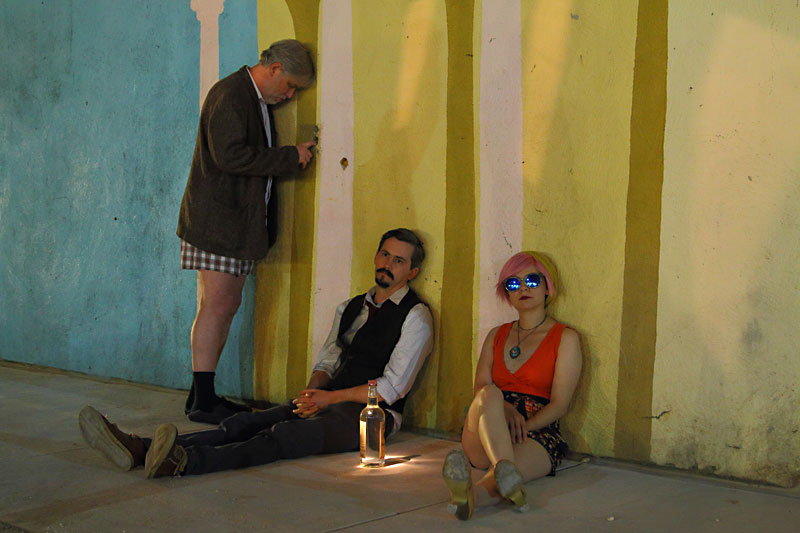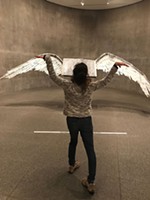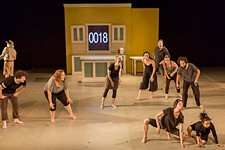The Hotel Vanya, or A Metaphysical-Paradigm at the End of Everythingness
For a getaway steeped in Chekhovian longing and ennui, The Hotel Vanya is the only place to stay
Reviewed by Robert Faires, Fri., June 3, 2016
In the hotel lobby, a gentleman with a snow-white beard and no pants sits in a high-backed chair and with his hands pulls himself and the wheeled chair along the edge of a borne settee. Around and around and around it he goes, seemingly oblivious to everything else about him – including the young woman in the extravagant kimono and geisha mask atop the settee's raised center – intent only on the tedious work of circling this piece of furniture, just as our world makes its way around the sun. A bizarre sight, yes, but this is the Hotel Vanya, where every act is redolent of life's ceaseless struggles and strains, and every room furnished with Chekhovian longing and ennui at no extra charge. Just ask Sonja, concierge and niece to the hotel's namesake – he's the one compulsively pulling himself around the settee – who's gone Japanese and ascended the sofa to recite another of her uncle's monologues, this one about living through the endless procession of days, bearing patiently the burdens that fate imposes, and humbly meeting the final hour of a bitter life of suffering and tears.
That speech, by the by, comes from Uncle Vanya, the original drama penned by Anton Chekhov, where it's delivered by that play's Sonja. Transposing it to another play in which it's a speech written by a character named Vanya and recited by a different Sonja, attired as a geisha, is one of many meta riffs on Chekhov by playwright Timothy Braun and the creative team for the Natalie George Productions premiere of The Hotel Vanya, or A Metaphysical-Paradigm at the End of Everythingness. Braun has appropriated names, attitudes and emotional states, and that existential gray mood from Chekhov and transplanted them to our Austin, to test how the sentiments of pre-revolution Russia suit a 21st century Texas city beset by aggressive growth and gentrification. Uncomfortably well, as it happens. As we stare at the bare brick walls of the raw industrial space where the show is staged (an abandoned warehouse east of Downtown), we can sense the imminence of the wrecking ball and imagine the upscale eatery or condo tower that will rise on the spot in about, oh, five minutes. As Chekhov's characters knew a century ago, an era is ending, and something that once mattered will soon be lost.
In the meantime, life must be lived, its repetitive toil endured – or else numbed with vodka. (A running gag in Braun's play, where the first wall knocked down is the fourth one, has characters interrupting their anguished exchanges to deliver plugs for the show's sponsor, a vodka distiller, that end with them exhorting the audience to "ride the potato.") While a couple of hotel guests still put on a brave face – as the engaged Girl and Boy, Katy Taylor and Zac Carr share a hilarious speech about how excited they are to be there, keeping their faces taut in euphoric grins even as disagreements and microaggressions creep into their dialogue – most can no longer hide the pain of the daily grind. Gricelda Silva's Sonja is a kettle on the boil, seething with frustration over her uncle's stupid monologues, over being dismissively labeled as "cute," and mostly over the indifference displayed toward her by the Good Doctor, for whom she pines. But Jeffery Mills' Doctor has resigned himself to the futility of it all, projecting a weariness that suggests his character's nerve endings went dead long ago. Only Vanya still seems to find purpose in life. Whether he's making one more round of the settee or scribbling down ideas for jokes, Robert Pierson's Vanya radiates a still-vital spark of joy, a candle flame in the gathering gloom.
The production follows Vanya's lead, lightening the gloom with a bracing theatricality. Braun never lets us forget we're watching a play (with Noel Gaulin's comically efficient Bell Boy, imported from a Wes Anderson film, as our friendly reminder), and director Dallas Tate builds on that with direct address that heightens the script's sense of play and odd and compelling moments crafted with lighting designer George, costume designer Glenda Wolfe, and, most strikingly, sound designer Robert Fisher. Ultimately, the play leaves us in what feels like a cul de sac, with an image suggesting we obsessively relive the painful endings in our lives the way, say, a conspiracy theorist replays the Zapruder film over and over to watch the instant of the bullet's impact. But leave it to this Vanya to suggest that a seed of tenderness and hope may be found in even the bleakest of endings. Maybe this hotel won't be totally lost after all.
The Hotel Vanya, or a Metaphysical-Paradigm at the End of Everythingness
Secret location revealed when tickets are purchasedwww.nataliegeorgeproductions.com
Through June 4
Running time: 1 hr., 30 min.













